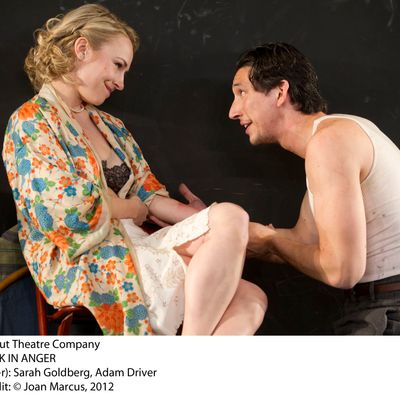
ItÔÇÖs impossible to reproduce the effect Look Back in Anger, John OsborneÔÇÖs scorching 1956 kitchen-sink screamer, wrought upon the polite English stage. Audiences accustomed to the wink-wink discretion of Coward and Rattigan were suddenly faced with a story about naked class rage, Kowalskian male energy, and exploding social mores in the winter of BritainÔÇÖs fifties discontent. What would Lady Bracknell have made of Jimmy (here, Matthew Rhys), a restive young lefty with a vicious verbal right hook? A working-stiff malcontent who ÔÇ£still thinks heÔÇÖs in the middle of the French RevolutionÔÇØ? Overeducated for his lowly station ÔÇö he runs a sweets shop ÔÇö Jimmy siphons off his fury in cacophonous trumpet playing, endless rants against the entitled silk-shirts ÔÇ£who want to escape from the pain of being alive,ÔÇØ and hellacious philippics against his wife, Alison (Sarah Goldberg), whose hand he won over serious protest from her posh parents. HeÔÇÖs like hellÔÇÖs on hummingbird, running on tea and beans. (ÔÇ£People like me donÔÇÖt get fat ÔǪ We just burn everything up.ÔÇØ) Devouring newspapers both posh and Red, he rails against society. Yet society, high and low, exists only in the abstract in Sam GoldÔÇÖs bare-bulb, bare-stage, bare-soul production: HeÔÇÖs pitilessly trimmed the physical production down to its dry bones ÔÇö the set is garbage, literally, with a scuffed black back wall installed at the proscenium line. The action has been shoved to the very precipice of the stage. (Gold has also cut a scene with AlisonÔÇÖs father: This┬áAnger belongs exclusively to the young.)
The choices are strong and the goal, I think, is to make JimmyÔÇÖs wish come true, in nightmare form: to clear the world of obfuscatory decorum and make it a classroom (complete with a backdrop resembling a chalkboard) for his general dissent. ÔÇ£Why donÔÇÖt we have a little game?ÔÇØ he begins, ÔÇ£LetÔÇÖs pretend weÔÇÖre human.ÔÇØ Does the lesson take? Sometimes. Gold ÔÇö in a shift away from the almost scientifically stilted emotional standoffs that have forged his reputation ÔÇö puts his actors into elbow-throwing overdrive. (He has to do something: Otherwise, itÔÇÖs all grit, growling and psychological realism, a Chicago play with more talking.) They toss cans, trash, food, and each other around the dirty-fingernail-clippingÔÇÖs worth of stage theyÔÇÖve been allowed. (No backstage, no wings ÔÇö even when theyÔÇÖre ÔÇ£off,ÔÇØ theyÔÇÖre on.) But you always feel them working against a distinct cultural disconnect that occasionally baffles the class-anesthetized American mind (well, this one, anyway) and makes JimmyÔÇÖs campaign of verbal sadism against Alison ÔÇö and AlisonÔÇÖs stiff-upper-lip toleration of it ÔÇö hard to comprehend on something deeper than a literary level.
Rhys, a disciplined and appealing actor best known for his role on ABCÔÇÖs Brothers & Sisters, does yeomanÔÇÖs work bridging that Atlantic-size gap, but he canÔÇÖt always find a toehold for JimmyÔÇÖs volcanic spasms of rue: He needs to be a Punk, capital P, but often he settles for lowercase, and we feel the deficit. The always-bizarre Adam Driver, struggling gamely with an accent, is a loose, welcome presence as Cliff, a working-class Welsh houseguest and AlisonÔÇÖs ambiguously platonic refuge from Jimmy. But the big rubbery lug seems to exist in an adjacent but dissimilar universe. Goldberg, who wears pain like a No mask, is the emotional core. Look Back in Anger plays best at full tilt, but its moments of quiet, reflective transition reveal this revivalÔÇÖs weaknesses and liver spots. I detected a brave, brainy, but only semi-successful attempt at spot-welding historical parallels: The squandered opportunities and squalid struggles of end-of-empire Britain stand in for the American center-leftÔÇÖs bitter post-tea-party disappointments. Toward the end of the play ÔÇö after numerous betrayals, walkouts, and walkbacks ÔÇö Jimmy asks us to choose: ÔÇ£ItÔÇÖs either this world or the next.ÔÇØ He asks us, but he doesnÔÇÖt make us. I couldnÔÇÖt find myself provoked, only worn down. This Look Back spends so much time so close to the edge, I wish IÔÇÖd felt a bit more vertigo.
Look Back in Anger is playing at the Laura Pels Theatre through April 8.

